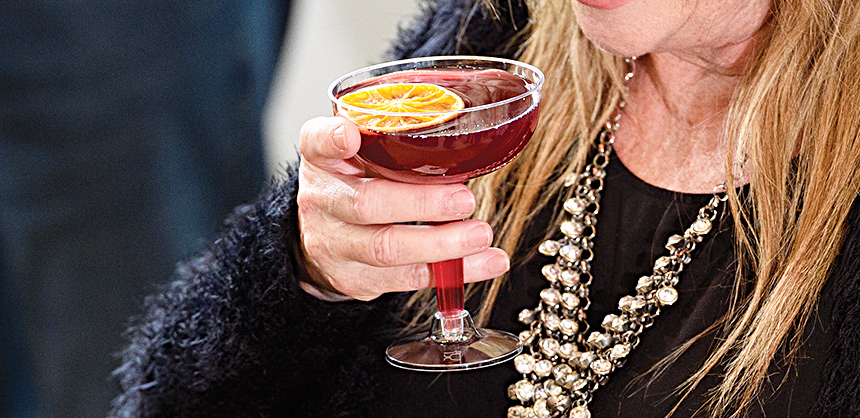BuzzkillApril 17, 2023
Alcohol May No Longer Mix at Corporate Events By Kathy MonteBuzzkill
Alcohol May No Longer Mix at Corporate Events
Adobe Stock
Marc Andreessen, co-founder of the venture capital firm, Andreessen Horowitz, created a furor when he called for a total ban on alcohol at tech industry events. He tweeted alcohol could lead to inappropriate behavior and could create an unwelcoming environment for women and minorities.
Andreessen isn’t the only prolific executive to make such a statement. Salesforce CEO Marc Benioff enacted a no-alcohol policy, saying alcohol is a drug and is unfair to the Ohana (Hawaiian word for family), who either do not want it or can be intolerant. The concept sparked a new group, Soberforce. It’s a community for sober, sober-curious and sober-allies at Salesforce. The growing group now includes 450 members.
The issue has intensified along with sexual harassment and assault incidents at tech events. As a result, the nonprofit group, Project WHEN (Workplace Harassment Ends Now), was created to help combat the issue. Studies show that alcohol consumption can increase the likelihood of these types of incidents and therefore a primary reason for the ban at corporate events.
Still, if there’s alcohol, experts say that corporate duties must be conducted during the social event. In addition, employees must be made aware the same standards of behavior will be in place during off-site events as those at the workplace.
“At first, the announcement that alcohol would be banned at industry events was met with mixed reactions,” Anthony Prusak, director of business development at FHT Global, says. “Some attendees were disappointed, while others welcomed the decision with open arms. As for me, I was in complete agreement with the ban. In my 30-plus years of experience, alcohol often leads to poor decision-making and inappropriate behavior at professional events. People can become loud and obnoxious, and it can be difficult to network and make meaningful connections in such an environment. I can purchase my own adult beverages outside of the event at a local bar or restaurant, if I choose.”
There can be other considerations as well, Prusak added: the risk of someone getting drunk, causing a scene or even getting into an auto accident. Another impetus behind the ban has been the emphasis on corporate diversity, equity and inclusion (DEI). Some could be in recovery for substance abuse.

To avoid drunk driving, provide transportation after an event, or ride-sharing vouchers. Adobe Stock
Alcohol Service Should Include Drunkenness Plan
If there’s alcohol at an event, there should be a contingency plan that outlines specific steps for dealing with drunkenness. For example, some sporting-event venues have stopped serving alcohol before the game ends. This tactic can help attendees sober up before leaving.
At any gathering, there will be people who choose not to drink. This should be respected and not spotlighted. The cocktail hour may not appeal to everyone. There are some who struggle with substances, others who do not imbibe because of religious practices, as well as for health reasons.
Differing Event Dynamics, Differing Precautions
Dana Toland, chief event planning strategist and sourcing specialist at IT Exchange Group, says the issue of serving alcohol or not depends on the type of attendees.
“In my 20-plus years of experience, I have never received a complaint of harassment or misconduct about another attendee’s actions resulting from overconsumption of alcohol,” she says.
“My conferences typically include 30% to 40 % of professional-international attendees, making for a diverse audience. They seem to enjoy a cocktail or two, but it is not the focus of their night.”
She does stress her company takes the issue seriously. As an added precaution, it hires extra bartenders and servers to help monitor consumption. “Our events also have 24-hour security,” Toland says. “We have walk-through receptions to make sure that there are no problems or potential problems. If we feel in advance that there is risk for overconsumption, then we have issued two-drink tickets to each attendee, and don’t permit them to purchase more. Plus, it is our company policy that two-to three-staff members remain in the reception and/or lobby bar area, until the area bars have closed for the evening.”
Banning Alcohol Isn’t Complicated, But is it the Best Solution?
Planners agree that an alcohol ban during events limits liability, which is always smart. It doesn’t have to be complicated.
“To enact the ban, organizers could simply choose not to serve alcohol at the event,” Prusak says. “They could also make it clear in their marketing materials and communications that alcohol will not be provided or tolerated. Finally, they could have security on hand to ensure that attendees are adhering to the policy.”
Event organizers can offer engaging activities that don’t revolve around alcohol. For example, they could host a panel discussion, keynote speaker or team-building exercise. These activities not only provide attendees with something to do, but also create opportunities for networking.
If alcohol is served, then professional bartenders should be hired so they can spot who has had too much to drink. If employees pour their own drinks, then it’s more likely they could over indulge.

Photo by Bre McGee / Courtesy of Zero Proof Collective
Nonalcoholic Beverages = Inclusivity
Cate Faulkner and Jen Gilhoi, cofounders of the Zero Proof Collective in Minneapolis, MN, want to promote more spaces with non-alcoholic beverages. They are educating planners about the growing non-alcoholic (NA) movement and its importance for corporate events. There are other beverages readily available for events, such as nonalcoholic, ready-to-drink beverages, NA spirits, NA wine and NA beer, as well as elevated, zero-proof cocktails.
Employee Resource Groups in many global companies are helping with the NA movement — as shown by Salesforce, Oracle and more.
“We are disrupting a space that has been centralized around alcohol and drink tickets that can only be redeemed for alcoholic drinks,” Gilhoi says. “At corporate NA bars we’ve hosted, it’s exciting to serve elevated nonalcoholic beverages that are equal to or higher value than alcoholic options. Employees appreciate this and we love seeing them redeem their drink ticket in anticipation of enjoying a celebratory beverage crafted just for them.”
These are not ho-hum, nonalcoholic drinks. At a recent corporate event, the offerings included elevated, zero-proof cocktails with names like Lemon Golang, Basil Rosa and Minneapple Mule.
“The flavor, garnishes and low sugar created quite a stir and provided a valued option for those who wanted to try something new, or those who choose not to drink for whatever reason,” Faulkner says. Her favorite comment came from a woman who walked up to the NA bar and said, “Where have you been all of my whole corporate life?”
Faulkner and Gilhoi agree corporations have the prerogative to ban alcohol, but this is not part of their mission. Zero Proof Collective’s mission is not about taking alcohol away but providing more nonalcoholic-beverage options at social gatherings. They say this is more aligned with the current NA movement as well as the cultural shift happening all over the world.
With Alcohol Comes Responsibility
“Giving full attention to the role of alcohol in planning your event will minimize the associated risks, such as unruly guests or worse,” says Wade Pederson, senior vice president of property and casualty and management liability at Woodruff Sawyer, an insurance brokerage and consulting firm. Woodruff Sawyer offers the following guidelines:
Review local and state laws regarding the sale and consumption of alcohol. You may need to obtain a special license or permit to serve alcohol during your event or confirm that the venue or caterers are properly authorized to do so.
Confirm with the venue that serving alcohol is permitted. In addition, bartenders should be licensed. Security should check identification, control access and enforce the last call.
Check if the venue has general liability, or liquor liability, insurance.
Woodruff Sawyer recommends using a mutually agreeable contract, which contains provisions that appropriately transfer risks to the caterer services. These provisions should include indemnification of your organization and require the vendor to provide a Certificate of Insurance. The contract should specifically require the inclusion of your organization as an additional insured under their Commercial General Liability insurance policy, as well as supported by the certificate as proof. This provides protection for the organization’s vicarious liability under the vendor’s insurance policy.
Part of screening vendors should include the training of servers and the assurance the vendor tracks that training and certification. Training for Intervention ProcedureS (TIPS) certification is a well-known program across the country. And in some states, like California, there are additional requirements for serving drinks, such as Responsible Beverage Service certification. Vendors should be able to show required certifications and how they track those who serve alcohol.
For mixed drinks, vendors should be able to show how they ensure the proper amount of each type of alcohol is dispensed. There is technology and auditing processes available to help make sure the intended amount of alcohol for each drink is correct.
Woodruff Sawyer also recommends using bar signs and giving servers orders to cut off those who are intoxicated.
Drunk Driving Liability
A drunken driver is the single largest risk associated with hosting an event. According to the National Highway Traffic Safety Administration, each day 32 people die in the U.S. from drunk driving crashes. There were 11,624 preventable deaths in 2020.
To eliminate this risk, provide transportation after your event. Another alternative is to offer ride-sharing vouchers for the event.
“I fully support the decision to ban alcohol at industry events,” Prusak says. “By doing so, organizers can create a more professional and productive environment that encourages networking and relationship building. And with a little creativity, there are plenty of alternative options that can help make the event just as enjoyable without the presence of alcohol.” C&IT








